Rohingya Refugees: Clouds still hang heavy over repatriation deal
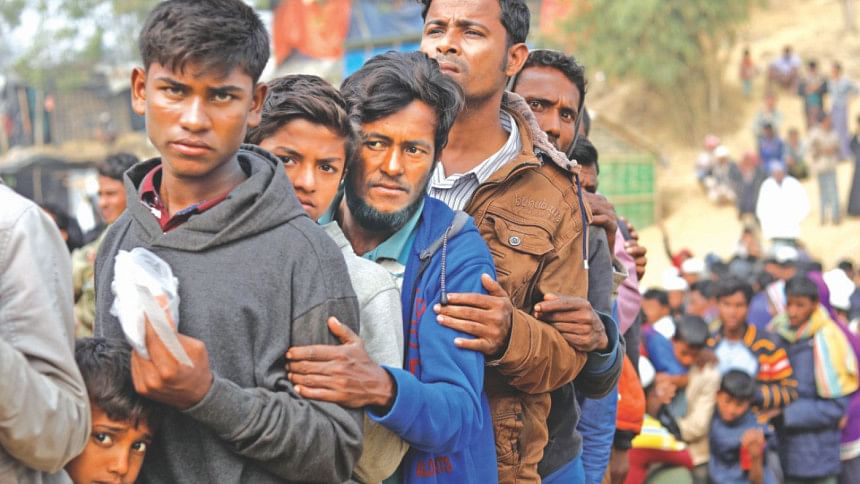
Bangladesh and Myanmar have agreed on a two-year timeframe for the repatriation of hundreds of thousands of Rohingya, expected to begin on January 23, amid global concern over the repatriation climate and the safety of the returnees.
"The repatriation would be completed preferably within two years from the commencement of repatriation," said Bangladesh foreign ministry in a statement yesterday, following the first joint working group meeting (JWG) in Naypyitaw on January 15-16.
The meeting agreed that the verification and the return of the Rohingya will be based on the family as a unit, and finalised the "verification form".
The two countries formed the JWG on December 19, following a repatriation deal signed on November 23 last year amid global outcry over the military crackdown that the UN and the US described as ethnic cleansing.
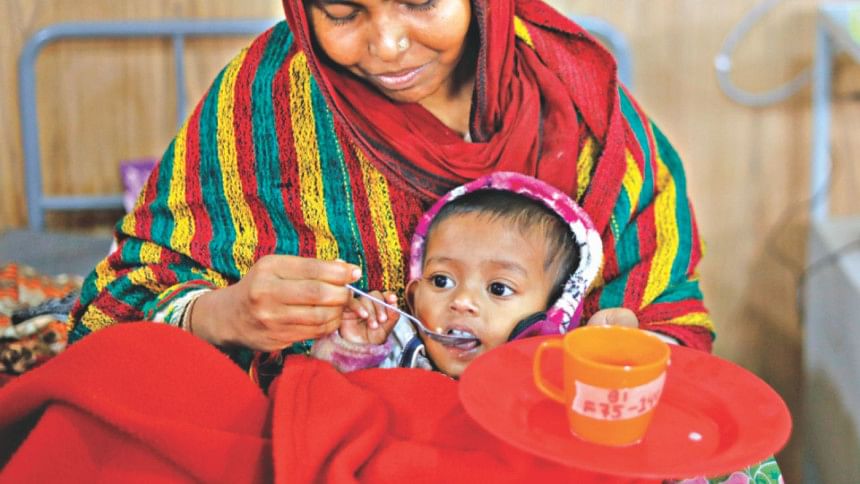
More than 673,000 Rohingya have fled violence in Myanmar's Rakhine state since August 25 after the Arakan Rohingya Salvation Army, a Rohingya insurgent group, attacked police and army posts.
According to the foreign ministry statement, Bangladesh would set up five transit camps from where returnees would be received initially at two reception centres on the Myanmar side.
The repatriation would begin on January 23 and Myanmar would shelter the returnees in a temporary accommodation at the Hla Pho Khung in Rakhine and then expeditiously rebuild houses of the returnees to move in there, it added.
On Tuesday, the UN Refugee Agency called for the Rohingya refugees to be informed about the conditions in Rakhine before they are allowed to return voluntarily and in safety.
"Major challenges have to be overcome," Andrej Mahecic, spokesman of the UNHCR told a news briefing in Geneva.
"These include ensuring they are told about the situation in their areas of origin ... and are consulted on their wishes, that their safety is ensured."
Contacted, Asif Munier, an independent researcher, said, "It is absurd for a Rohingya to think of returning to Myanmar voluntarily because Myanmar has not taken any such measure that makes Rakhine safe for them and guarantees their rights."
As there is no UN involvement in the verification process as was the case in 1992, there remains a lot of doubts over how voluntary and safe the repatriation would be, he noted.
He said Bangladesh and Myanmar could surely have bilateral talks and sign agreements, but the Rohingya crisis was no more a bilateral issue. So involvement of the international community, specifically the UN, is a must.
The Rohingya, who are denied citizenship and other basic rights such as health, education and freedom of movement in Myanmar, have fled to Bangladesh to escape violence before -- in 2016, 1991-92 and in 1978 -- but the latest violence has been the worst.
Doctors without Borders said more than 6,700 Rohingya, including at least 730 children under five, were killed in the first month of the crackdown.
And though Myanmar now says it would provide citizenship to some Rohingya, they have no reason to trust Myanmar, said Asif Munier.
"The Rohingya are still fleeing to Bangladesh because they are afraid to live there. How can you expect the traumatised people to return?" he said, referring to Myanmar's reiteration of commitment in the Physical Arrangement to stop the outflow of Myanmar residents to Bangladesh.
On sheltering the Rohingya in the transit camps, he said if they were kept in the camps in Myanmar, there was no guarantee the camps inside Myanmar would be better than those in Bangladesh.
'LIVING LIKE PRISONERS'
Already, a group of refugees at the Kutupalong Rohingya camp expressed doubt about the two "temporary settlement" camps Myanmar has agreed to establish on its side of the border, reports Reuters.
Mohammad Farouk, 20, who fled from Maungdaw, said exchanging one camp for another made little difference -- except "the camps in Myanmar will be far worse, because we will be confined there and there will be a risk to our lives."
Another resident of the Kutupalong camp compared the new transit camps to ones set up near the Rakhine state capital of Sittwe following bouts of violence in previous years "where people are living like prisoners".
"First, ask the military to give those Rohingya their homes and property back, then talk to us about returning," said the Rohingya refugee who did not want to be identified.
Some said the kind of violence they witnessed toward their community in Myanmar made it hard for them to trust the military. "Even if I don't get food or anything else here, at least there is safety. I won't feel safe if I go back to Myanmar," said Rashid Ahmed, 33.
Noor Alam, 37, who came to Kutupalong five months back, wondered if he could ever get a job in Myanmar. "They don't even call us Rohingya. Until they consider us citizens we won't go back."
If forced to go back, Alam said he would tell Bangladesh authorities to "kill me here instead."
Some young men in the camp worried they might be arrested on accusations of terrorism if they returned. "I will stay here. I will work at a tea shop, mobile phone shop. I will do anything," said Mohammed Rafiq, 14.
UK CONCERNED
British MPs have expressed grave concern over the repatriation plan "without any clear understanding of their legal status and destination".
In a report published yesterday, the Commons International Development Committee of the UK Parliament said it was clear that the Myanmar army used rape and sexual violence as the weapons of war.
"The potential return of 100,000 Rohingya to Myanmar without any clear understanding of their legal status, destination, or even whether they have volunteered for the return trip, is a matter of grave concern," it said.
The committee said plans to begin repatriation for the displaced Rohingya people from Bangladesh to Myanmar were well underway without evidence of consultation or involvement with the community.
Previous episodes of displacement and return of the Rohingyas and other ethnic minorities in Myanmar over the last 20 years "do not inspire confidence," the report said.
"For decades, the Rohingya people in Rakhine state endured discrimination, marginalisation and abuse. The Rohingya have paid a heavy price for the lack of consensus amongst the international community on how and when to decide to act effectively. We cannot fail them again," said Stephen Twigg MP, also the chair of the committee.
ORPHANS INCLUDED IN REPATRIATION PLAN
The Bangladesh foreign ministry statement said Myanmar would consider resettling the people staying at the zero line on a priority basis.
Both countries agreed to form two technical working groups -- one on verification and the other on return.
"Modalities for repatriation of orphans and children born out of unwarranted incidence have been incorporated in the said arrangement," the statement said.

 For all latest news, follow The Daily Star's Google News channel.
For all latest news, follow The Daily Star's Google News channel. 

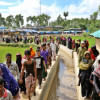
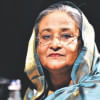


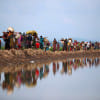


Comments